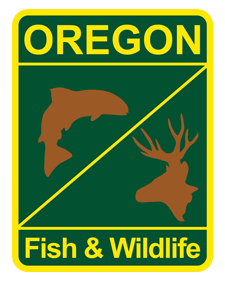
Hunters bring banned elk parts into Rogue Valley from CWD-positive states
by ODFW
12-2-2017
Website

Two local hunters recently brought prohibited elk parts from Colorado and Wyoming into the Rogue Valley. The elk were harvested in these states which have some deer, elk and moose infected with Chronic Wasting Disease (CWD), a fatal neurological disease.
Oregon is still a CWD-free state. It has never been detected in captive or free-ranging deer, elk, or moose in Oregon.
However, the risk of non-reversible disease transmission to wild ungulates is high because even one infected animal can affect the future of all susceptible species in the state. By bringing potentially CWD-infected elk parts containing central nervous system tissue into Oregon, these hunters jeopardized the health and population of Oregon’s deer, elk, and moose.
Oregon State Police cited the hunters. This follows a similar case earlier in November where a Madras man also brought banned parts of a CWD-positive deer harvested in Montana to Oregon. ODFW collected the banned parts and incinerated them which is one of the only ways to destroy the pathogen.
Duane Dungannon, State Coordinator for the Oregon Hunters Association says hunters play a critical role in keeping CWD out of Oregon.
“We need hunters who go out of state to be vigilant and not bring prohibited ungulate parts back to Oregon. CWD represents perhaps the greatest threat to our big game because it has the potential to devastate our ungulate populations,” Dungannon said.
OHA has been seriously concerned about preventing the spread of this disease to wild game herds. The group has advocated for tight regulations on game ranching and has consistently funded disease research and prevention across the state.
People hunting in states with CWD who harvest a deer, elk or moose may only bring back parts without spinal cord or brain tissue (e.g. no spinal column and only antlers on a clean skullcap). See page 29 of the Oregon Big Game Regulations under “Parts Ban” for more information.
CWD is caused by a protein prion that damages the brain of infected animals, causing progressive neurological disease and loss of body condition. It’s untreatable and always fatal. It spreads through none-to-nose contact between infected animals and through the animal’s bodily fluids. The priors that cause CWD can also last a long time in the environment, infecting new animals for decades, which is why Oregon has had a parts ban in place for 15 years.
ODFW State Wildlife Veterinarian Colin Gillin said CWD is considered one of the most devastating wildlife diseases on the American landscape today.
“Once CWD enters a state and infects free-ranging deer and elk, it has been nearly impossible to eradicate with present day tools. We want to do all we can to keep Oregon CWD-free,” Gillin said.
ODFW has monitored the state’s wildlife for CWD for years and is increasing its surveillance this year by asking hunters interested in having their deer or elk tested for CWD to contact their local office to set up an appointment. Hunters need to bring in the animal’s head, which should be kept cool prior to sampling if possible. ODFW is most interested in testing deer and elk that are at least two years old (e.g. not spikes).
ODFW also asks taxidermists and game meat processors throughout the state to alert the agency or OSP if banned deer, elk or moose parts are brought to them from CWD-positive states for processing. ODFW will collect the banned parts and properly dispose of them via incineration.
Anyone who sees or harvests a sick deer or elk should also report it to the ODFW Wildlife Health Lab at 866-968-2600 or by email to Wildlife.Health@state.or.us.
Cases of CWD have occurred in Alberta, Arkansas, Colorado, Illinois, Kansas, Maryland, Michigan, Minnesota, Missouri, Montana, Nebraska, New Mexico, New York, North Dakota, Ohio, Oklahoma, Pennsylvania, South Dakota, Texas, Utah, Virginia, West Virginia, Wisconsin, Wyoming and Saskatchewan.
Website Hosting and Design provided by TECK.net